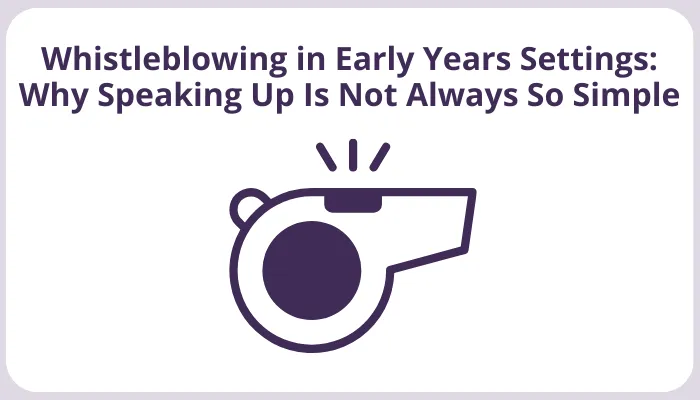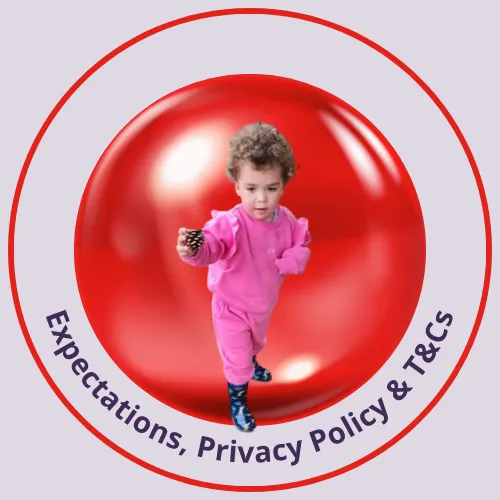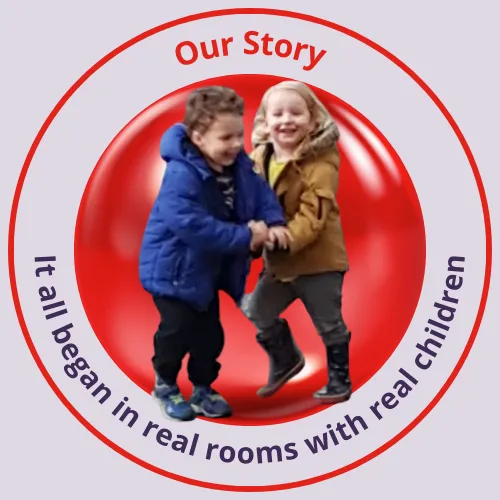Every child's well-being matters.
Best Practice Ideas for Safeguarding Articles
Quick Access

Whistleblowing in Early Years Settings: Why Speaking Up Is Not Always So Simple
Creating a safe, nurturing environment for children is paramount in early years education. The Early Years Foundation Stage (EYFS) safeguarding framework sets clear expectations for high standards of care, vigilance, and accountability. However, despite robust policies, whistleblowing remains a challenging aspect of practice.
As we approach the 2025 EYFS safeguarding reforms, it's vital to reassess whether our current whistleblowing culture is genuinely effective, where policy is embedded in practice.
Raising concerns, whether about poor practice, a colleague's well-being, or unsafe expectations set by management, can feel overwhelmingly emotional and complex. In some settings, there may be a culture of silence or difficulties with misplaced loyalties, discouraging practitioners from coming forward, even when they recognise issues.
The Hidden Barriers to Speaking Out
Many managers believe they've cultivated an open-door culture. Yet, even trusted practitioners may hesitate to raise concerns, especially if it involves reporting a teammate. Closeness may be a stumbling block when the team is small and close-knit. To whistleblow may feel personal rather than following a set professional procedure.
Common reasons that might hold practitioners back include:
Fear of backlash or alienation: Raising concerns can lead to subtle exclusion or strained relationships, even in supportive teams.
Fear of going against the boss or management: Bringing attention to inadequacies about the EYFS standards may lead to future awkward or uncomfortable conditions.
Loyalty to colleagues: Staff may hesitate to speak up about someone they like or empathise with, especially if they think the issue isn't malicious.
Lack of confidence: Less experienced practitioners may be unsure about what constitutes a serious concern or may worry about not being taken seriously.
Normalisation of poor practice: When low standards go unchallenged over time, they can become the accepted norm.
When concerns go unvoiced, poor practice can gradually become embedded, undermining the very foundations of quality care and safe practice that EYFS safeguarding depends on. Worrying about these troubling scenarios can impact a practitioner's own well-being and distract from their ability to focus fully on the well-being of the children they support.
A Wake-Up Call for Managers
Leadership teams must honestly reflect on the whistleblowing culture within their settings. A written policy is only the beginning; a genuine safety culture requires that staff feel psychologically secure, knowing they will be listened to, supported, and not judged for raising concerns.
Consider:
When was the last time a team member raised a safeguarding, well-being, or practice concern?
Do staff know how to raise an issue and feel confident doing so?
Is silence being mistaken for everything being fine?
How do or would management handle a concern raised in this way?
The risks of misjudging silence for compliance: A Wake-Up Call for Nursery Standards
If open communication isn't actively enabled, early years safeguarding and EYFS well-being issues may go unreported.
Perhaps invite anonymous feedback via staff surveys or check-in conversations—sometimes the first step is simply asking the question.
New EYFS Safeguarding Reforms: Strengthening Whistleblowing Procedures
Effective from 1st September 2025, there are new whistleblowing requirements (Department for Education EYFS Safeguarding Reforms).
These changes aim to clarify when and how to escalate safeguarding concerns and bolster practitioner confidence in whistleblowing to enhance child safety.
The reforms bring the early years sector's practice in line with the current school expectations and emphasise the importance of clear and accessible whistleblowing procedures to keep children as safe as possible.
Technology Can Help Break the Silence
One practical way to support staff is by offering discreet, effective tools that make whistleblowing easier and less intimidating. That's where On the Button (weareonthebutton.com) comes in.
On the Button is a well-being, safeguarding, and complaint management tool designed for early years settings. Unlike repurposed school systems, it's tailored to the unique challenges of early years environments.
With On the Button, practitioners can:
Raise safeguarding or well-being concerns discreetly, even while still working with children.
Send instant alerts to senior staff for support if a colleague is distressed or a situation becomes unsafe.
Highlight poor practice or unrealistic expectations without leaving their room or approaching a manager directly.
Submit concerns either anonymously or in person, offering choice and security.
Ensure alerts go directly to senior leaders via email and SMS, ensuring prompt attention.
For management teams, On the Button offers a real-time alert system and a clear audit trail, helping ensure concerns are acted on promptly and reducing the risk of missed safeguarding issues
By integrating tools like this, settings can make whistleblowing not only more accessible but also a standard part of their EYFS complaint management and early years safeguarding processes.
Creating a Culture of Responsibility
Speaking up need not be about blame but about responsibility. Fostering a culture where the children come first in every context will help the whole setting focus on their responsibilities and put scenarios that may crop up into perspective. This ethos with established whistleblowing procedures empowers early years professionals with the tools and confidence to speak up when something doesn't feel right. Poor practice can take root in the absence of clear communication, and opportunities to safeguard children and each other can be missed.
As managers and leaders, proactive steps are essential to encouraging teams to raise concerns, to support early years well-being. Being proactive involves open conversations, supportive leadership, and a practical system that enables policy to be implemented, like On the Button, where removing barriers helps make it easier to do the right thing. Because safeguarding is everyone's responsibility, silence should never be an easy option in the early years.
AUTHORS:- On the Button is developed by early years professionals at Quality Early Years - the creators of the UK's first dedicated software for Well-being, Safeguarding and Complaint Management in childcare. Built from hands-on experience in nurseries. The platform helps teams stay alert, accountable, and prepared to respond. Every missed sign puts a child's future at risk - is your team On the Button?
Built by professionals with frontline experience, On the Button is the UK's first specialist software designed to support early years safeguarding, EYFS complaint management, and early years well-being in a single, intuitive system. We help preschools, nurseries, and children's clubs stay compliant, accountable, and proactive in protecting children. Every detail matters when it comes to EYFS safeguarding.
Quick Access

Whistleblowing in Early Years Settings: Why Speaking Up Is Not Always So Simple
Creating a safe, nurturing environment for children is paramount in early years education. The Early Years Foundation Stage (EYFS) safeguarding framework sets clear expectations for high standards of care, vigilance, and accountability. However, despite robust policies, whistleblowing remains a challenging aspect of practice.
As we approach the 2025 EYFS safeguarding reforms, it's vital to reassess whether our current whistleblowing culture is genuinely effective, where policy is embedded in practice.
Raising concerns, whether about poor practice, a colleague's well-being, or unsafe expectations set by management, can feel overwhelmingly emotional and complex. In some settings, there may be a culture of silence or difficulties with misplaced loyalties, discouraging practitioners from coming forward, even when they recognise issues.
The Hidden Barriers to Speaking Out
Many managers believe they've cultivated an open-door culture. Yet, even trusted practitioners may hesitate to raise concerns, especially if it involves reporting a teammate. Closeness may be a stumbling block when the team is small and close-knit. To whistleblow may feel personal rather than following a set professional procedure.
Common reasons that might hold practitioners back include:
Fear of backlash or alienation: Raising concerns can lead to subtle exclusion or strained relationships, even in supportive teams.
Fear of going against the boss or management: Bringing attention to inadequacies about the EYFS standards may lead to future awkward or uncomfortable conditions.
Loyalty to colleagues: Staff may hesitate to speak up about someone they like or empathise with, especially if they think the issue isn't malicious.
Lack of confidence: Less experienced practitioners may be unsure about what constitutes a serious concern or may worry about not being taken seriously.
Normalisation of poor practice: When low standards go unchallenged over time, they can become the accepted norm.
When concerns go unvoiced, poor practice can gradually become embedded, undermining the very foundations of quality care and safe practice that EYFS safeguarding depends on. Worrying about these troubling scenarios can impact a practitioner's own well-being and distract from their ability to focus fully on the well-being of the children they support.
A Wake-Up Call for Managers
Leadership teams must honestly reflect on the whistleblowing culture within their settings. A written policy is only the beginning; a genuine safety culture requires that staff feel psychologically secure, knowing they will be listened to, supported, and not judged for raising concerns.
Consider:
When was the last time a team member raised a safeguarding, well-being, or practice concern?
Do staff know how to raise an issue and feel confident doing so?
Is silence being mistaken for everything being fine?
How do or would management handle a concern raised in this way?
The risks of misjudging silence for compliance: A Wake-Up Call for Nursery Standards
If open communication isn't actively enabled, early years safeguarding and EYFS well-being issues may go unreported.
Perhaps invite anonymous feedback via staff surveys or check-in conversations—sometimes the first step is simply asking the question.
New EYFS Safeguarding Reforms: Strengthening Whistleblowing Procedures
Effective from 1st September 2025, there are new whistleblowing requirements (Department for Education EYFS Safeguarding Reforms).
These changes aim to clarify when and how to escalate safeguarding concerns and bolster practitioner confidence in whistleblowing to enhance child safety.
The reforms bring the early years sector's practice in line with the current school expectations and emphasise the importance of clear and accessible whistleblowing procedures to keep children as safe as possible.
Technology Can Help Break the Silence
One practical way to support staff is by offering discreet, effective tools that make whistleblowing easier and less intimidating. That's where On the Button (weareonthebutton.com) comes in.
On the Button is a well-being, safeguarding, and complaint management tool designed for early years settings. Unlike repurposed school systems, it's tailored to the unique challenges of early years environments.
With On the Button, practitioners can:
Raise safeguarding or well-being concerns discreetly, even while still working with children.
Send instant alerts to senior staff for support if a colleague is distressed or a situation becomes unsafe.
Highlight poor practice or unrealistic expectations without leaving their room or approaching a manager directly.
Submit concerns either anonymously or in person, offering choice and security.
Ensure alerts go directly to senior leaders via email and SMS, ensuring prompt attention.
For management teams, On the Button offers a real-time alert system and a clear audit trail, helping ensure concerns are acted on promptly and reducing the risk of missed safeguarding issues
By integrating tools like this, settings can make whistleblowing not only more accessible but also a standard part of their EYFS complaint management and early years safeguarding processes.
Creating a Culture of Responsibility
Speaking up need not be about blame but about responsibility. Fostering a culture where the children come first in every context will help the whole setting focus on their responsibilities and put scenarios that may crop up into perspective. This ethos with established whistleblowing procedures empowers early years professionals with the tools and confidence to speak up when something doesn't feel right. Poor practice can take root in the absence of clear communication, and opportunities to safeguard children and each other can be missed.
As managers and leaders, proactive steps are essential to encouraging teams to raise concerns, to support early years well-being. Being proactive involves open conversations, supportive leadership, and a practical system that enables policy to be implemented, like On the Button, where removing barriers helps make it easier to do the right thing. Because safeguarding is everyone's responsibility, silence should never be an easy option in the early years.
AUTHORS:- On the Button is developed by early years professionals at Quality Early Years - the creators of the UK's first dedicated software for Well-being, Safeguarding and Complaint Management in childcare. Built from hands-on experience in nurseries. The platform helps teams stay alert, accountable, and prepared to respond. Every missed sign puts a child's future at risk - is your team On the Button?
Built by professionals with frontline experience, On the Button is the UK's first specialist software designed to support early years safeguarding, EYFS complaint management, and early years well-being in a single, intuitive system. We help preschools, nurseries, and children's clubs stay compliant, accountable, and proactive in protecting children. Every detail matters when it comes to EYFS safeguarding.

Whistleblowing in Early Years Settings: Why Speaking Up Is Not Always So Simple
Creating a safe, nurturing environment for children is paramount in early years education. The Early Years Foundation Stage (EYFS) safeguarding framework sets clear expectations for high standards of care, vigilance, and accountability. However, despite robust policies, whistleblowing remains a challenging aspect of practice.
As we approach the 2025 EYFS safeguarding reforms, it's vital to reassess whether our current whistleblowing culture is genuinely effective, where policy is embedded in practice.
Raising concerns, whether about poor practice, a colleague's well-being, or unsafe expectations set by management, can feel overwhelmingly emotional and complex. In some settings, there may be a culture of silence or difficulties with misplaced loyalties, discouraging practitioners from coming forward, even when they recognise issues.
The Hidden Barriers to Speaking Out
Many managers believe they've cultivated an open-door culture. Yet, even trusted practitioners may hesitate to raise concerns, especially if it involves reporting a teammate. Closeness may be a stumbling block when the team is small and close-knit. To whistleblow may feel personal rather than following a set professional procedure.
Common reasons that might hold practitioners back include:
Fear of backlash or alienation: Raising concerns can lead to subtle exclusion or strained relationships, even in supportive teams.
Fear of going against the boss or management: Bringing attention to inadequacies about the EYFS standards may lead to future awkward or uncomfortable conditions.
Loyalty to colleagues: Staff may hesitate to speak up about someone they like or empathise with, especially if they think the issue isn't malicious.
Lack of confidence: Less experienced practitioners may be unsure about what constitutes a serious concern or may worry about not being taken seriously.
Normalisation of poor practice: When low standards go unchallenged over time, they can become the accepted norm.
When concerns go unvoiced, poor practice can gradually become embedded, undermining the very foundations of quality care and safe practice that EYFS safeguarding depends on. Worrying about these troubling scenarios can impact a practitioner's own well-being and distract from their ability to focus fully on the well-being of the children they support.
A Wake-Up Call for Managers
Leadership teams must honestly reflect on the whistleblowing culture within their settings. A written policy is only the beginning; a genuine safety culture requires that staff feel psychologically secure, knowing they will be listened to, supported, and not judged for raising concerns.
Consider:
When was the last time a team member raised a safeguarding, well-being, or practice concern?
Do staff know how to raise an issue and feel confident doing so?
Is silence being mistaken for everything being fine?
How do or would management handle a concern raised in this way?
The risks of misjudging silence for compliance: A Wake-Up Call for Nursery Standards
If open communication isn't actively enabled, early years safeguarding and EYFS well-being issues may go unreported.
Perhaps invite anonymous feedback via staff surveys or check-in conversations—sometimes the first step is simply asking the question.
New EYFS Safeguarding Reforms: Strengthening Whistleblowing Procedures
Effective from 1st September 2025, there are new whistleblowing requirements (Department for Education EYFS Safeguarding Reforms).
These changes aim to clarify when and how to escalate safeguarding concerns and bolster practitioner confidence in whistleblowing to enhance child safety.
The reforms bring the early years sector's practice in line with the current school expectations and emphasise the importance of clear and accessible whistleblowing procedures to keep children as safe as possible.
Technology Can Help Break the Silence
One practical way to support staff is by offering discreet, effective tools that make whistleblowing easier and less intimidating. That's where On the Button (weareonthebutton.com) comes in.
On the Button is a well-being, safeguarding, and complaint management tool designed for early years settings. Unlike repurposed school systems, it's tailored to the unique challenges of early years environments.
With On the Button, practitioners can:
Raise safeguarding or well-being concerns discreetly, even while still working with children.
Send instant alerts to senior staff for support if a colleague is distressed or a situation becomes unsafe.
Highlight poor practice or unrealistic expectations without leaving their room or approaching a manager directly.
Submit concerns either anonymously or in person, offering choice and security.
Ensure alerts go directly to senior leaders via email and SMS, ensuring prompt attention.
For management teams, On the Button offers a real-time alert system and a clear audit trail, helping ensure concerns are acted on promptly and reducing the risk of missed safeguarding issues
By integrating tools like this, settings can make whistleblowing not only more accessible but also a standard part of their EYFS complaint management and early years safeguarding processes.
Creating a Culture of Responsibility
Speaking up need not be about blame but about responsibility. Fostering a culture where the children come first in every context will help the whole setting focus on their responsibilities and put scenarios that may crop up into perspective. This ethos with established whistleblowing procedures empowers early years professionals with the tools and confidence to speak up when something doesn't feel right. Poor practice can take root in the absence of clear communication, and opportunities to safeguard children and each other can be missed.
As managers and leaders, proactive steps are essential to encouraging teams to raise concerns, to support early years well-being. Being proactive involves open conversations, supportive leadership, and a practical system that enables policy to be implemented, like On the Button, where removing barriers helps make it easier to do the right thing. Because safeguarding is everyone's responsibility, silence should never be an easy option in the early years.
AUTHORS:- On the Button is developed by early years professionals at Quality Early Years - the creators of the UK's first dedicated software for Well-being, Safeguarding and Complaint Management in childcare. Built from hands-on experience in nurseries. The platform helps teams stay alert, accountable, and prepared to respond. Every missed sign puts a child's future at risk - is your team On the Button?
Built by professionals with frontline experience, On the Button is the UK's first specialist software designed to support early years safeguarding, EYFS complaint management, and early years well-being in a single, intuitive system. We help preschools, nurseries, and children's clubs stay compliant, accountable, and proactive in protecting children. Every detail matters when it comes to EYFS safeguarding.




Facebook
Instagram
LinkedIn
Youtube